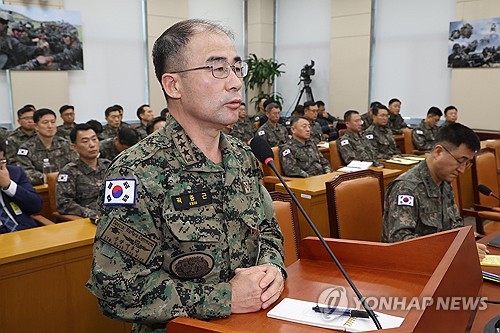- California Assembly OKs highest minimum wage in nation
- S. Korea unveils first graphic cigarette warnings
- US joins with South Korea, Japan in bid to deter North Korea
- LPGA golfer Chun In-gee finally back in action
- S. Korea won’t be top seed in final World Cup qualification round
- US men’s soccer misses 2nd straight Olympics
- US back on track in qualifying with 4-0 win over Guatemala
- High-intensity workout injuries spawn cottage industry
- CDC expands range of Zika mosquitoes into parts of Northeast
- Who knew? ‘The Walking Dead’ is helping families connect
(2nd LD) Army special warfare commander says Yoon ordered him to drag out lawmakers
The chief of the Army Special Warfare Command said Tuesday he was ordered by President Yoon Suk Yeol to drag out lawmakers from the National Assembly building during martial law operations last week.
Lt. Gen. Kwak Jong-keun made the claim during a parliamentary defense committee meeting, saying Yoon called him on a secured phone.
“He said the quorum didn’t appear to be met yet, so I should break down the doors, and go in and drag out the people inside,” he said.

The commander was referring to the quorum for lifting Yoon’s martial law decree, which is 150 of the 300 members of parliament. Ultimately, 190 lawmakers voted unanimously to lift the order.
Kwak said he consulted with commanders in the field about whether to storm into the parliamentary building while firing blanks or cut off power to stop the lawmakers from voting.
The commanders advised against such actions, and Kwak said he agreed with their judgment.
“Even if they were to go inside to execute the order, the troops involved would later become lawbreakers and too many people would be injured if they broke their way in, so I judged it wasn’t right,” he said.
“I told them not to go inside further, and after seeing them move away, I stopped them from undertaking any additional operations,” he added.
When asked if he reported his actions to Yoon, Kwak said he did not and that he explained the situation to then Defense Minister Kim Yong-hyun as the troops withdrew.
Kwak also told Rep. Park Beom-kye of the main opposition Democratic Party (DP) that he was aware of the details of the martial law plan two days in advance, on Dec. 1, though he did not know with certainty that martial law would be imposed.
“Commander Kwak did not tell the prosecution that he knew in advance,” Park said. “He said he did not testify because those involved in the martial law operations had already agreed on what they were going to say.”
On the instructions he received on Dec. 1, Kwak said his mission was to secure six locations — the National Assembly, three places associated with the National Election Commission, the DP headquarters and Flower Research, an opinion polling company.
The mission was relayed to him by then Defense Minister Kim over a secure landline, he said.
“In my head, I was thinking, ‘This is what I should do if it really happens,’ but I did not tell the subordinate brigade commanders,” he said. “If I told them, it could get the brigade commanders into trouble as well, so I only told them as they were being deployed on the day.”
Kwak added he believed the mission was more likely related to issues on the front lines, rather than the imposition of martial law.
When asked whether Yoon had used words such as gun, fire, blanks or armored cars, Kwak said he did not, as far as he could remember.











